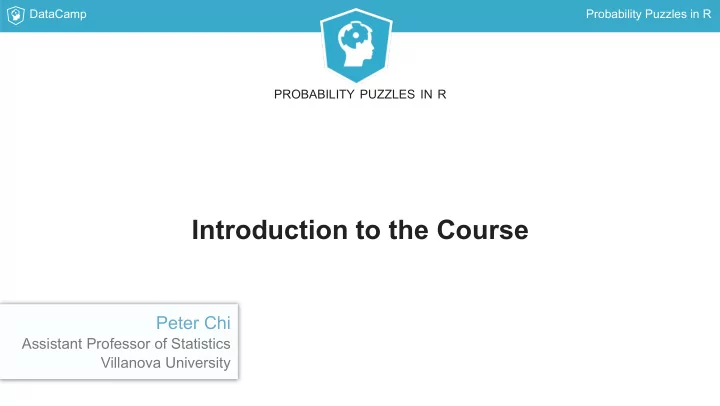

DataCamp Probability Puzzles in R PROBABILITY PUZZLES IN R Introduction to the Course Peter Chi Assistant Professor of Statistics Villanova University
DataCamp Probability Puzzles in R Course overview Chapter 1: The Classics Chapter 3: Inspired by the Web The Birthday Problem iPhone Passcode Combinations Monty Hall Sign Error Cancellation Factoring a Quadratic Chapter 2: Games with Dice Chapter 4: Poker Games Yahtzee Settlers of Catan Texas Hold'em Hole Cards Craps Consecutive Cashes in the WSOP von Neumann Model of Poker
DataCamp Probability Puzzles in R Combinatorics factorial(n) factorial(3) = 3! = 3 × 2 × 1 factorial(3) [1] 6 choose(n,k) 5 ) 5! choose(5,3) = = ( 3 3!×(5−3)! choose(5,3) [1] 10
DataCamp Probability Puzzles in R Simulations Select an object at random - sample() Simulate a coinflip - rbinom() Repeat a process replicate() Loops: for , while Set a seed - set.seed()
DataCamp Probability Puzzles in R More details on for loops for(i in 1:10){ sum(sample(x = c(1,2,3,4,5,6), size = 2, replace = TRUE)) } Storing the results: rolls <- rep(NA, 10) for(i in 1:10){ rolls[i] <- sum(sample(x = c(1,2,3,4,5,6), size = 2, replace = TRUE)) } rolls [1] 3 6 3 9 9 3 6 11 9 10
DataCamp Probability Puzzles in R Functions my_function <- function(n){ answer <- n^3 return(answer) } my_function(10) [1] 1000
DataCamp Probability Puzzles in R PROBABILITY PUZZLES IN R Let's practice!
DataCamp Probability Puzzles in R PROBABILITY PUZZLES IN R The Birthday Problem Peter Chi Assistant Professor of Statistics Villanova University
DataCamp Probability Puzzles in R Problem overview Setup Room with n people in it What is the probability that anyone shares the same birthday? Assumptions Ignore February 29th Birthdays are uniformly distributed across the remaining 365 days Each individual in the room is independent
DataCamp Probability Puzzles in R Defining a counter Simulating the probability of rolling a 12 counter <- 0 roll_dice <- function(k){ all_rolls <- sample(c(1,2,3,4,5,6), k, roll <- roll_dice(2) replace = TRUE) roll final_answer <- sum(all_rolls) [1] 12 return(final_answer) } if(roll == 12){ counter <- counter + 1 } counter [1] 1
DataCamp Probability Puzzles in R Incrementing a counter in a loop Simulating the probability of rolling a 12 counter <- 0 for(i in 1:10000){ roll <- roll_dice(2) if(roll == 12){ counter <- counter + 1 } } p_twelve <- counter / 10000 print(p_twelve) [1] 0.0278 1/36 [1] 0.02777778
DataCamp Probability Puzzles in R The pbirthday function pbirthday(10) [1] 0.1169482 room_sizes <- c(1:10) match_probs <- sapply(room_sizes, pbirthday) print(match_probs) [1] 0.000000000 0.002739726 0.008204166 0.016355912 0.027135574 [6] 0.040462484 0.056235703 0.074335292 0.094623834 0.116948178
DataCamp Probability Puzzles in R Plotting plot(match_probs ~ room_size)
DataCamp Probability Puzzles in R PROBABILITY PUZZLES IN R Let's solve it!
DataCamp Probability Puzzles in R PROBABILITY PUZZLES IN R Monty Hall Peter Chi Assistant Professor of Statistics Villanova University
DataCamp Probability Puzzles in R Choose one of the doors
DataCamp Probability Puzzles in R One door is revealed
DataCamp Probability Puzzles in R Revealing a door with reverse indexing The doors object: doors [1] 1 2 3 Suppose that Door #1 is chosen, and Door #2 contains the prize... Revealing the remaining door: reveal <- doors[-c(1,2)] reveal [1] 3
DataCamp Probability Puzzles in R Revealing a door at random The doors object: doors [1] 1 2 3 Suppose that Door #1 is chosen, and Door #1 in fact contains the prize... Revealing the remaining door: reveal <- sample(x = doors[-1], size = 1)
DataCamp Probability Puzzles in R PROBABILITY PUZZLES IN R Let's try it!
Recommend
More recommend